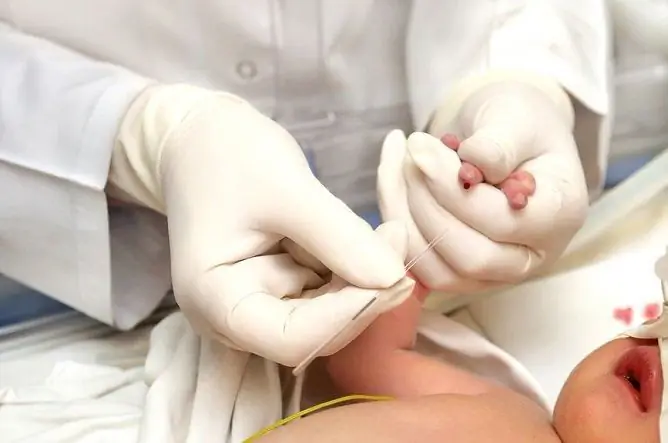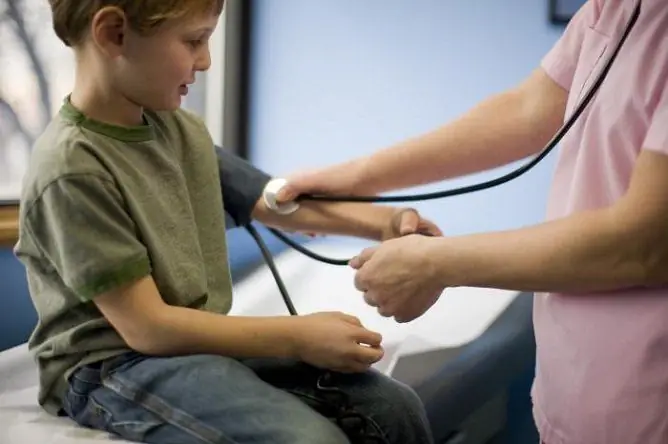- Author Rachel Wainwright wainwright@abchealthonline.com.
- Public 2023-12-15 07:39.
- Last modified 2025-11-02 20:14.
Dysbacteriosis in children under one year old
Dysbiosis (dysbiosis) is called intestinal dysfunction, in which the balance and ratio of harmful and beneficial bacteria are disturbed.

With a decrease in the number of beneficial microorganisms in the intestine, a putrefactive or fermentative form of fungi develops. With dysbiosis in children under one year old, there is a feeling of discomfort in the abdomen. Until recently, dysbiosis was considered a disease, but nowadays it is becoming more and more popular to believe that this disease is fictitious and non-existent. In infants, this condition is considered quite normal. If the symptoms of dysbiosis have not disappeared in a child up to five months, then you should consult a specialist. The doctor will help you find out the true reasons for the disruption of the digestive system. Dysbacteriosis in children under one year old often accompanies various diseases.
Possible causes of dysbiosis in a month-old baby
Dysbacteriosis in a month-old baby can appear with late or improper attachment to the breast. If not properly applied during breastfeeding, the baby swallows air. Also, this condition can occur in a child with inappropriate nutrition of the mother, taking antibiotics. Dysfunction of the digestive tract can also occur with frequent change of mixtures, abrupt weaning of the baby from the breast, and improper introduction of complementary foods.
The cause of the development of dysbiosis in children under one year old can be infectious diseases of various origins (viral diarrhea, salmonellosis). A similar condition can appear in case of unfavorable environmental conditions, diathesis, allergic reactions.
Microorganisms support the vital activity of the human body, but they themselves easily die under the influence of external factors. These factors include taking antibiotics.
Dysbacteriosis in children after antibiotics develops because all antibacterial drugs destroy both pathogenic and beneficial bacteria within the limits of their effect. When taking such drugs, all types of bacteria of the intestinal flora suffer, and opportunistic organisms can multiply rapidly under these conditions. And thus, dysbiosis gradually develops in children after antibiotics.
Symptoms of intestinal dysbiosis in children
The symptoms of intestinal dysbiosis in children are similar to the symptoms that accompany digestive tract problems. This condition can be suspected if the child has diarrhea and constipation, loss of appetite. It is accompanied by dysbiosis and bloating due to the accumulation of gases, as well as cramping pains in the abdominal region of a periodic nature.
In case of violations of the intestinal microflora, the so-called "slippage of food" is quite often observed, when the baby immediately asks for the pot after eating. In this case, undigested food and mucus can be seen in the feces, and the feces have an unpleasant odor.
Symptoms of intestinal dysbiosis in children under one year old can also be various allergic reactions (skin rashes and peeling).
With dysbiosis, the absorbing function of the intestine is disrupted, which in the future can lead to a deficiency in the child's body of minerals and vitamins. The baby's hair may break, hair exfoliates, gums bleed. In general, with this condition, the defenses of the child's body decrease, the child's immunity suffers. All kinds of infectious and viral diseases easily penetrate into a weakened body.
Diagnosis of dysbiosis in children under one year old
Diagnosis of intestinal dysbiosis will allow to correctly assess the quality of the intestinal microflora, the ratio of pathogenic and normal microorganisms in the digestive tract.
Diagnosis of this condition is carried out using a microbiological analysis of feces. By analyzing feces, you can determine the sensitivity of bacteria to various drugs. This will help you choose a treatment regimen and choose the right drugs.
For this analysis, parents need to collect about 5-10 grams of feces. The material should not be stored for a long time at room temperature, since it will no longer be possible to determine the intestinal microflora.
To determine dysbiosis in children under one year old and assess the activity of the digestive tract, a coprogram is often prescribed. Using this method, it is possible to assess the ability of the child's intestines to digest food, to identify violations of its absorption and splitting.
Evening feces are also suitable for this analysis, but it must be stored in a closed glass container (in the refrigerator).
Treatment of dysbiosis in children
For the treatment of dysbiosis in children under one year old, all drugs should be prescribed by a doctor. A gastroenterologist, pediatrician, infectious disease specialist or allergist can choose the correct treatment regimen and prescribe drugs. Currently, there are a huge number of drugs for the treatment of dysbiosis.
To restore the intestinal microflora, enzyme preparations are usually prescribed (Bifiform, Bifidumbacterin, Hilak-Forte, Lactulose). All of these preparations contain beneficial microorganisms.
Sometimes, in addition, the doctor may prescribe enterosorbents for the absorption and removal of pathogenic bacteria from the body. In special cases, with symptoms of intestinal dysbiosis, antibacterial drugs (Furazolidone, Metronidazole, Nifuroxazide) are prescribed.

To restore the body, vitamin-mineral complexes and immunomodulators can also be prescribed.
Prevention of dysbiosis in children under one year old
Prevention of dysbiosis should be started not after the birth of the child, but during the planning of pregnancy. Already during this period, the expectant mother should monitor the state of the microflora of the genital organs.
After the birth of a baby, for the prevention of dysbiosis in children under one year old, it is very important to start breastfeeding in a timely manner. The likelihood of a violation of the intestinal microflora is significantly reduced with prolonged breastfeeding of the child.
As the child grows up, it is useful to give fermented milk products with bifidobacteria as complementary foods. Supplemental probiotics are also beneficial for children who are often ill.
Found a mistake in the text? Select it and press Ctrl + Enter.






